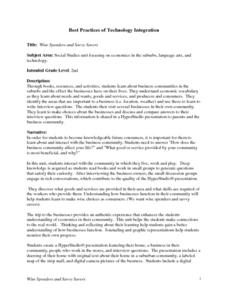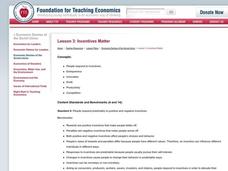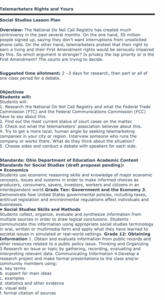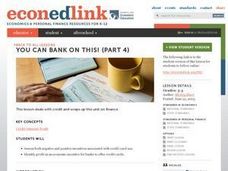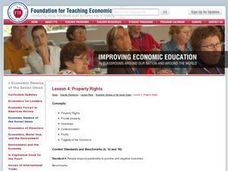Curated OER
Wise Spenders and Savvy Savers
Second graders investigate the business community in their own town. They design interview questions before interviewing business people. They look at what type of good and services are offered in their area. They design a multimedia...
Curated OER
Everyday Heroes
Here is a nice way to allow your pupils to recognize important people in their lives. After a class discussion that focuses on the many unrecognized everyday heroes, kids make a list of their everyday heroes. Learners create an award for...
Federal Reserve Bank
Savvy Savers
What are the benefits and risks of saving in an interest-bearing account? Pupils explore concepts like risk-reward relationship and the rule of 72, as well as practice calculating compound interest, developing important personal finance...
American Museum of Natural History
Be a Water Saver
Everyone must do their part to make a difference. The lesson link provides an 11-item questionnaire to reflect on conservation practices. Simple and straightforward, the lesson is perfect as a remote learning resource or as a tool for an...
Federal Reserve Bank
What Do People Say?
After reading a series of fictitious letters that represent actual events during the time period, young historians craft a small town newsletter to explain the causes of the Great Depression.
Curated OER
Life Savers?: Exploring Ethical Dilemmas Regarding AIDS Treatment in South Africa
Students participate in a roundtable forum to discuss the notion of defying South African national government policies in order to fight AIDS after reading the online article, "A Bold Move on AIDS in South Africa."
Council for Economic Education
A Penny Saved
A penny saved is a penny earned! Scholars research the different ways to save money over a lifetime. They investigate the Rule of 72, compound interest, and sub-prime loans to gain an understanding of how banks aid in the saving process....
Curated OER
Money: Kids and Cash
Students discuss what a bank is and what it is used for. In this mathematics lesson plan, students solve problems related to interest and percentages.
Curated OER
Incentives Matter
Learners identify what motive people. They will learn about both positive, and negative incentives. They will use this knowledge to make predictions about how people will behave. They will apply this knowledge to economics.
Curated OER
Rollunder Tag
Students engage in a instructional activity that involves the playing of tag with two taggers who chase others around a gymnasium. They practice the game until all of the people in the gym are tagged out. This game works on physical...
Texas State Energy Conservation Office
Are Your Computers Wasting Energy?
After reading about the amount of energy that is used to power a personal computer, learners take a look at their own computer use and therefore, their energy consumption. They do this through a series of questions and computations on...
Curated OER
Finding, Gathering, Saving Seeds
Students understand the importance of saving seeds. In this saving seeds lesson, students dry out seeds for later use planting. Students recognize that one plant may have many seeds.
Federal Reserve Bank
Wait, Is Saving Good or Bad? The Paradox of Thrift
Could saving really harm the economy? Discover the paradox of thrift and how decreases in consumption can affect economic recovery and various markets and industries.
Curated OER
A Lesson To Accompany "The First Bank of the United States: A Chapter in the History of Central Banking"
Here is an interesting topic. Learners examine the economics that led to the founding of the First Bank of America. They participate in a reader's theater experience depicting the debate between Alexander Hamilton and Thomas Jefferson...
Federal Reserve Bank
Financial Fables: Shopping Wisely with Olivia Owl
Cover two subjects with one instructional activity! First, dive into English language arts; read an eBook, answer comprehension questions, and complete a cause and effect chart about the financial fable, Shopping Wisely with Olivia Owl....
Give and Let Live
Blood and Transplant: Bone Marrow
What causes someone to need a bone marrow transplant? Fascinate your class with a lesson on the intricate task of procuring bone marrow for patients suffering from illnesses like leukemia. The fourth and final installment in a series...
Curated OER
A Home Energy Audit
Students investigate ways to save energy. For this environmental lesson, students play the role of a building inspector and identify "culprits" that waste energy. Students use a checklist to identify specific practices that waste energy.
Curated OER
The Economic Way of Thinking - About Everything
Students write their definitions of economics on index cards and revise them as the lesson continues. They discuss the principles of economic reasoning and after completing a quiz, use economic reasoning to solve "real life" mysteries.
Curated OER
Telemarketers Rights and Yours
Learners research the controversy of whether or not the National Do Not Call Registry is constitutional, and then hold a class debate. Students research the National Do Not Call Registry, the FTC, the FCC, and the most current status of...
Council for Economic Education
You Can BANK on This! (Part 4)
Students assess both negative and positive incentives associated with credit card use. They identify profit as an economic incentive for banks to offer credit cards.
Curated OER
Green Spaces
Learners map the green spaces around their school and predict the impact of population growth on green spaces in their region.
Curated OER
Property Rights: Soviet Farms
Students examine the problems with the collectivized agriculture program in the Soviet Union. They listen to a teacher-led lecture, participate in a property rights scenario activity, create a plan for maximizing the value of land, and...
Curated OER
Reading Comprehension
In this reading comprehension worksheet, students read and answer questions. Students read a short passage and answer six questions about what they just read.
Curated OER
Saving on Home Energy Use Activity
In this saving energy worksheet, students click on the links to learn about saving energy and then answer short answer questions about it. Students complete 10 questions total.


